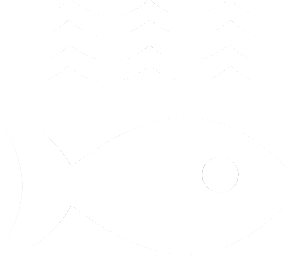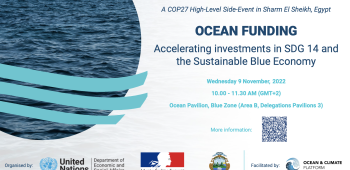Oceans and Seas
Description
Oceans, seas and coastal areas form an integrated and essential component of the Earth’s ecosystem and are critical to sustainable development. They cover more than two-thirds of the earth’s surface and contain 97% of the planet’s water. Oceans contribute to poverty eradication by creating sustainable livelihoods and decent work. Over three billion people depend on marine and coastal resources for their livelihoods. In addition, oceans are crucial for global food security and human health. They are also the primary regulator of the global climate, an important sink for greenhouse gases and they provide us with water and the oxygen we breathe. Finally, oceans host huge reservoirs of biodiversity.
The importance of oceans for sustainable development is widely recognized by the international community and embodied in Chapter 17 of Agenda 21, the Johannesburg Plan of Implementation and various decisions taken by the Commission on Sustainable Development. The Millennium Ecosystem Assessment emphasizes that all humans depend on the Earth’s ecosystems and the services they provide. In the Rio+20 outcome document,The future we want, Member States called for “holistic and integrated approaches to sustainable development that will guide humanity to live in harmony with nature and lead to efforts to restore the health and integrity of the Earth’s ecosystem”. In this context, they stressed, among others, the importance of “the conservation and sustainable use of the oceans and seas and of their resources for sustainable development, including through their contributions to poverty eradication, sustained economic growth, food security and creation of sustainable livelihoods and decent work…”. Accordingly, the Proposal of the Open Working Group on Sustainable Development Goals submitted to the United Nations General Assembly in August 2014 contained sustainable development goal (SDG) 14 which aims to “Conserve and sustainable use the oceans, seas and marine resources for sustainable development”. Issues related to oceans and seas are addressed in the 10 targets under SDG 14, as well as many other related SDGs, under the 2030 Agenda for Sustainable Development, the outcome document of the United Nations summit for the adoption of the posst-2015 development agenda in 2015.
In order for oceans, seas and marine resources to successfully contribute to human well-being, ecosystem integrity, with properly functioning biogeochemical and physical processes, is required. This does not require unperturbed systems, but systems that have not suffered serious or irreversible harm. Ecosystem integrity allows for the provision of so-called supporting ecosystem services which, in turn, are the bases of important regulating, provisioning and cultural ecosystem services that are of crucial importance for humans. Whereas the benefits provided by oceans, seas and marine resources are important to all people, the poor, indigenous peoples, and vulnerable groups with a high dependency on natural resources and ecosystem services may have their well-being especially tied to these benefits. The link between oceans, seas and marine resources and human well-being is not one-sided. While an increase in human well-being is frequently generated at the cost of ecosystem integrity, it can also potentially reduce the negative anthropogenic impacts on the marine environment due to a more sustainable use of resources, changes in production and consumption patterns and improved management and control of human activities, for example. In order for this to happen, good governance and an enabling environment are, however, required.
Oceans, seas and marine resources are increasingly threatened, degraded or destroyed by human activities, reducing their ability to provide crucial ecosystem services. Important classes of threats are, among others, climate change, marine pollution, unsustainable extraction of marine resources and physical alterations and destruction of marine and coastal habitats and landscapes. The deterioration of coastal and marine ecosystems and habitats is negatively affecting human well-being worldwide.
Good governance, an enabling environment, sustainable land- and marine- based human activities, and adequate measures will be required to reduce the negative anthropogenic impacts on the marine environment, for example due to a more sustainable use of resources, changes in production and consumption patterns and improved management and control of human activities. Projects and measures should ideally be designed and implemented in an integrated, cross-sectoral and cross-scale manner, in line with the ecosystem approach and involving all stakeholders.
Human well-being cannot be achieved without the protection and conservation of the Earth’s ecosystem. To maintain the quality of life that the oceans have provided to humankind, while sustaining the integrity of their ecosystems, a change will be required in how humans view, manage and use oceans, seas and marine resources.
For more information and documents on this topic, please visit this link
Pagination
| Title | Category | Date Sort ascending |
|---|---|---|
| League of Arab States | Statements | 9-Jun-2017 |
| Major Group: Children and Youth | Major Groups | 9-Jun-2017 |
| Mauritius | Statements | 9-Jun-2017 |
| AquaFed | Major Groups | 9-Jun-2017 |
| Legambiente | Major Groups | 9-Jun-2017 |
| International Telecommunication Union (ITU) | Statements | 9-Jun-2017 |
| Cyprus | Statements | 9-Jun-2017 |
| European Union | Statements | 9-Jun-2017 |
| Mongolia | Statements | 9-Jun-2017 |
| The Ocean Cleanup | Major Groups | 9-Jun-2017 |
| United Nations Office for Project Services (UNOPS) | Statements | 9-Jun-2017 |
| Iceland | Statements | 9-Jun-2017 |
| Ms. Biliana Cicin-Sain, President, Global Ocean Forum, Professor of Marine Policy,… | Statements | 9-Jun-2017 |
| Nigeria | Statements | 9-Jun-2017 |
| Natural Resources Defense Council | Major Groups | 9-Jun-2017 |
Pagination
Second UN Ocean Conference (2022, Lisbon)
The ocean covers 70 percent of the Earth’s surface, is the planet's largest biosphere, and is home to up to 80 percent of all life in the world. It generates 50 percent of the oxygen we need, absorbs 25 percent of all carbon dioxide emissions and captures 90 percent of the additional heat generated from those emissions. It is not just ‘the lungs of the planet’ but also its largest carbon sink - a vital buffer against the impacts of climate change.
It nurtures unimaginable biodiversity and produces food, jobs, mineral and energy resources needed for life on the planet to survive and thrive. There is a great deal we still do not know about the ocean but there are many reasons why we need to manage it sustainably- as set out in the targets of Sustainable Development Goal 14: Life Below Water.
The science is clear – the ocean is facing unprecedented threats as a result of human activities. Its health and ability to sustain life will only get worse as the world population grows and human activities increase. If we want to address some of the most defining issues of our time such as climate change, food insecurity, diseases and pandemics, diminishing biodiversity, economic inequality and even conflicts and strife, we must act now to protect the state of our ocean.
First UN Ocean Conference (2017, New York)
Our oceans, our future: partnering for the implementation of Sustainable Development Goal 14
The high-level United Nations Conference to Support the Implementation of Sustainable Development Goal 14: Conserve and sustainably use the oceans, seas and marine resources for sustainable development (informally, The Ocean Conference) was convened at United Nations Headquarters in New York from 5 to 9 June 2017, coinciding with World Oceans Day, to support the implementation of Sustainable Development Goal 14. The Governments of Fiji and Sweden held the co-hosting responsibilities of the Conference.
Special Envoy for the Ocean

Click here to learn about the latest activities of Peter Thomson, Special Envoy for the Ocean
Background
At the high-level United Nations Conference to Support the Implementation of Sustainable Development Goal 14 (SDG 14) - The Ocean Conference - held in June 2017 at UN headquarters in New York, close to 1,400 voluntary commitments for concrete action to advance implementation of SDG 14 were made by governments, the United Nations system, civil society organizations, academia, the scientific community, and the private sector. These commitments, together with the Conference outcome document Our Ocean, Our Future: Call for Action, mark a global breakthrough on the path to sustainable management and conservation of our oceans, seas and marine resources.
Each of the Ocean Conference voluntary commitments addresses one or several of the SDG 14 targets, often with associated positive impacts on other SDGs, including for example SDG 3 on good health and well-being and SDG 13 on climate action, among others.
To follow up on the implementation of these voluntary commitments; to catalyze and generate new voluntary commitments; and to facilitate collaboration and networking amongst different actors in support of SDG 14, the United Nations has launched nine thematic multi-stakeholder Communities of Ocean Action.
Each community is coordinated by designated focal points who work together with United Nations Secretary-General's Special Envoy for the Ocean, Ambassador Peter Thomson, and the UN Department of Economic and Social Affairs in carrying out the activities.
For more information, visit: https://sdgs.un.org/topics/oceans-and-seas/coas




